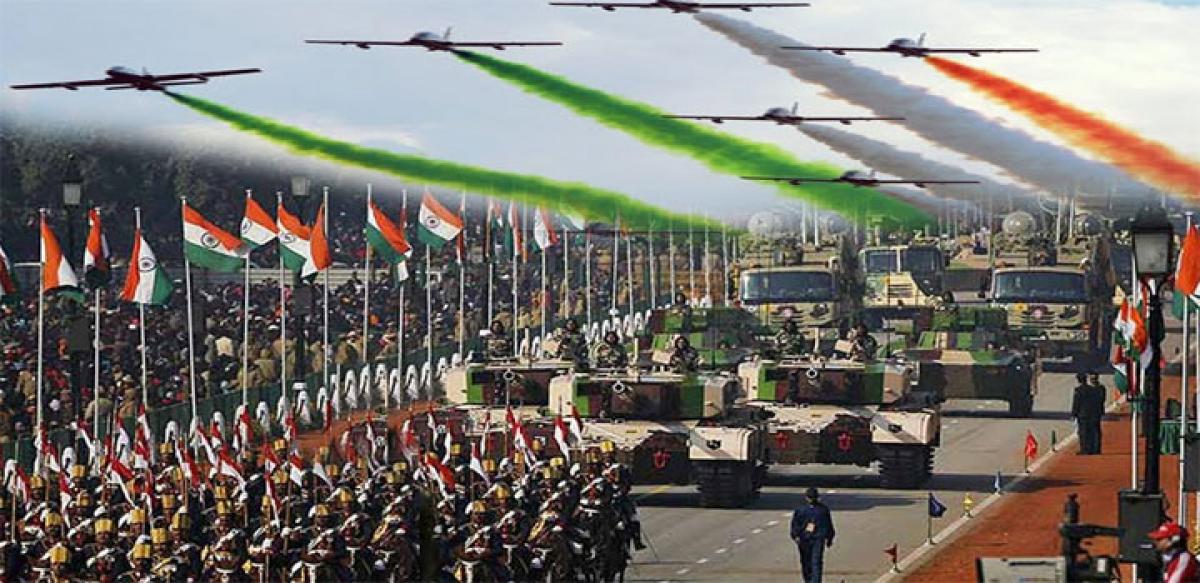Live
- Australian govt orders national review into school bullying
- Isro's Busy End to 2024: Key Space Missions, Including Spadex and Proba-3, Planned for December
- Rajaka Udyoga Sangam new committee elected
- Astronauts Stuck in Space: Sunita Williams and Barry Wilmore's Mission Extended Until February 2025
- 'Muslims don't vote for JD(U)', says Union Minister Lalan Singh
- St. Joseph’s organises literary fest
- Indian GenAI startups see 6 times surge in funding in Q2
- Revanth is a liar: Errabelli
- Big B pens heartfelt note for Abhishek’s work in latest film: You are Arjun Sen
- BGT 2024-25: India on brink of victory in Perth as Australia reach 227/8 at tea
Just In

The adoption of the Republican Constitution on January 26, 1950, was a momentous event in the history of contemporary India. Therefore, its observance as Republic Day is not just a ritual. But, the day should mark our unflinching commitment to the constitutional values that continue to guide this republic’s destiny.
The adoption of the Republican Constitution on January 26, 1950, was a momentous event in the history of contemporary India. Therefore, its observance as Republic Day is not just a ritual. But, the day should mark our unflinching commitment to the constitutional values that continue to guide this republic’s destiny.
This Constitution gave us parliamentary democracy which despite many shortcomings continues to sustain the political fabric of this diverse nation. Given the fate of democracies across the Third World, the maintenance of democracy in India itself is a significant accomplishment.
The Directive Principles of State Policy enshrined in the Constitution of India directs the State to promote the welfare of the people by securing “a social order in which justice, social, economic and political, shall inform all the institutions of the national life.”
It enjoins the State to see that the “control of the material resources of the community are so distributed as best to subserve the common good” and to ensure that the “operation of the economic system does not result in the concentration of wealth and means of production to common detriment.”
But, this remains a moral mandate only. The colonial forms of social and economic inequalities are still pervasive. Dr B R Ambedkar observed: "Indians today are governed by two different ideologies. Their political ideal set in the Preamble of the Constitution affirms a life of liberty, equality and fraternity. Their social ideal embodied in their religion denies them."
The growing religious bigotry and this obscurantist manifestation negate the republican idealism. To quote Ambedkar again, "Constitution is not a mere lawyer’s document; it is a vehicle of Life, and its spirit is always the spirit of age.” But, there are attempts at times to alter the very basic foundation on which the Constitution stands.
The Constitution is built on certain fundamental features which the Supreme Court of India described as the basic structure. Every provision of the Constitution can be amended, provided in the result the basic structure of the Constitution remains the same.
The basic elements of the Indian Constitution include secular and federal character, demarcation of power between the legislature, the executive and the judiciary, the dignity of the individual, democratic form of government, etc. The forces of authoritarianism often try to eclipse the democratic values.
Unitary features propelled by politics negate federal spirit. The religious fundamentalism wants to repudiate secular character. The self-centred political executive encroaches upon other pillars of democracy through its brute legislative majority. Still, the Indian democracy is thriving because of its impregnable constitution.
As Carl J Friedrich in ‘Man and His Government’ said:” A Constitution is a living system. But just as in a living, organic system, such as the human body, various organs develop and decay, yet the basic structure or pattern remains the same with each of the organs having its proper function; so also in a Constitutional system the basic institutional pattern remains, even though the different component parts may undergo significant alterations.”
The strength of the Constitution lies entirely in the determination of each citizen to defend it. Only if every single citizen feels duty-bound to do his share in this defense are the constitutional rights secure.

© 2024 Hyderabad Media House Limited/The Hans India. All rights reserved. Powered by hocalwire.com







